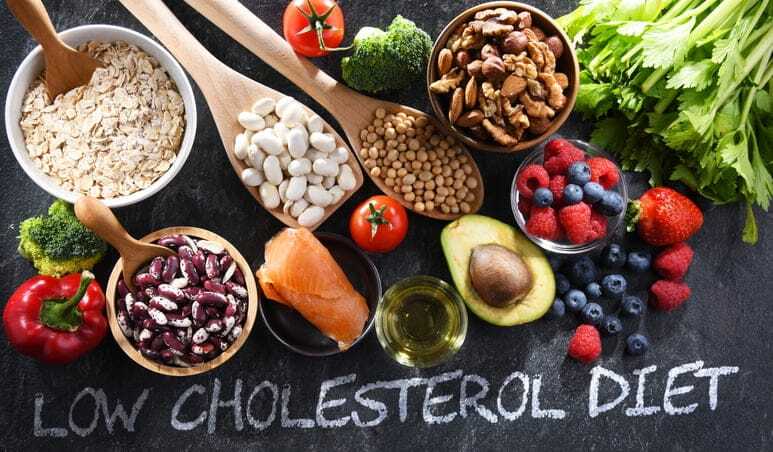How to lower bad (LDL) cholesterol naturally

What is LDL Cholesterol?
LDL cholesterol or commonly called “bad cholesterol,” is that fraction of cholesterol in the blood that is formed by low-density lipoproteins and that, when found in high levels, can be deposited in the arteries, promoting the formation of “atheromas”, which then become inflamed and obstruct the passage of blood, leading to heart attacks or strokes.
Maintaining LDL cholesterol levels below 130 mg/dl is one of the objectives of reducing cardiovascular risk.
LDL cholesterol levels can be lowered in two ways, through medication that prevents the formation of cholesterol in the liver or through lifestyle changes. The latter is the most recommended as it has no adverse effects. In addition, by changing our lifestyle, we prevent other chronic diseases.
Diet plays a fundamental role in the management of LDL cholesterol levels. However, contrary to what many people believe, it is not necessary to stop consuming cholesterol-rich foods to lower blood cholesterol. It is essential to consume the right fats and supplement with other compounds from foods that can help eliminate excess cholesterol from the body and decrease its hepatic synthesis.
These are the best foods to reduce LDL cholesterol:
Olive oil: It is rich in oleic acid, a monounsaturated fat that helps lower LDL cholesterol levels. In addition, this type of fat is neutral, meaning it does not oxidize quickly like other unsaturated fats. Finally, olive oil is one of the oils with the highest smoke point, which makes it ideal for cooking at high temperatures without being modified.
Vegetables: They contain phytosterols, plant compounds with a similar structure to animal cholesterol. This allows them to compete at the intestinal level for absorption. The cholesterol of animal origin that is not absorbed is eliminated through the feces. Phytosterols are also found in certain fortified food products such as yogurts.
Nuts: They are rich in fiber and unsaturated fats, making them an excellent dietary addition if you are looking to lower cholesterol. A review of 25 studies showed that eating more healthy nuts was associated with lower levels of total and LDL cholesterol, as well as a decrease in triglycerides.
Seeds: They contain vegetable fats and phytosterols. Flax seeds are the most recommended since, thanks to their high level of linolenic acid, they can reduce total and LDL cholesterol levels. It also helps to lower triglycerides.
Salmon: Fatty fish such as salmon are rich in omega-3 fatty acids that provide numerous properties. Not only do they help lower LDL cholesterol and triglycerides, but it is also the only type of fat that helps increase levels of good cholesterol or HDL.
Turmeric: Contains a powerful active ingredient called curcumin, which has been shown to reduce total and LDL cholesterol levels in the blood.
Garlic: Famous for its many health-promoting properties, studies have shown that garlic can also have a positive effect on cholesterol levels. According to an evaluation of 39 research studies, incorporating garlic into the diet on a regular basis for a minimum period of two months can lower cholesterol levels, thereby reducing the risk of heart disease.
Legumes: Studies show that a diet rich in legumes such as lentils, beans, and peas is associated with lower blood cholesterol levels. One of the causes is the high supply of soluble fiber. This type of fiber absorbs cholesterol molecules in the digestive tract and helps them to be eliminated through the feces.
Green tea: Recognized for its high content of antioxidants and catechins, making it a healthy option to include in the daily diet. Research has shown that consuming green tea can reduce total and LDL cholesterol levels, making it a healthy alternative to improve cardiovascular health.
Avocados: They are an excellent source of fiber, potassium, and healthy fats, which can help keep cholesterol levels in balance. Research has shown that avocados not only help increase beneficial HDL cholesterol levels but can also reduce total and unhealthy LDL cholesterol. Their primary source is monounsaturated fats.
Whole grains: Like legumes, whole grains, mainly oats, are associated with lower LDL cholesterol levels thanks to their contribution of soluble fiber, mainly beta-glucans.
Microgreens: these miniature vegetables contain high concentrations of essential nutrients such as vitamins and minerals and bioactive compounds such as polyphenols, carotenoids, and flavonoids. Several studies have shown that microgreens have beneficial health potential, including the ability to lower blood cholesterol levels. In particular, microgreens from broccoli, radish, and cilantro have been shown to have significant hypocholesterolemic effects.
The presence of bioactive compounds in microgreens appears to be the primary mechanism behind their cholesterol-lowering effect. For example, sulforaphane, a compound present in broccoli, has been shown to inhibit cholesterol synthesis in the liver and reduce LDL cholesterol levels in the blood. Likewise, phenolic compounds present in radish and cilantro have also been linked to lower cholesterol levels.
In addition, microgreens are also rich in fiber, which may contribute to their hypocholesterolemic effect. The soluble fiber present in microgreens can bind to cholesterol in the intestine and remove it from the body before it is absorbed into the blood.
In summary, microgreens can be a healthy and beneficial addition to the diet to reduce blood cholesterol levels. Their content of bioactive compounds and fiber may help inhibit cholesterol synthesis and reduce cholesterol absorption in the gut, which may have positive effects on cardiovascular health.
| Food | Hypocholesterolemic effect |
| Olive oil | Oleic fatty acid |
| Vegetables | Phytosterols |
| Nuts | Fiber and unsaturated fatty acids (omega 6 and omega 3) |
| Seeds | Linolenic fatty acid |
| Salmon | Omega 3 fatty acids |
| Tumeric | Curcumin |
| Garlic | Sulfur compounds |
| Legumes | Soluble fiber |
| Green tea | Antioxidants and catechins |
| Avocados | Monounsaturated fatty acids (oleic acid) |
| Whole grains | Betaglucans |
| Microgreens | Antioxidant phenolic compounds, sulforaphane, fiber. |
Consuming certain foods is not always possible, either due to a lack of habit or food preferences. That is why it is good to supplement with certain dietary supplements that have proven to be efficient in lowering LDL cholesterol:
Krill oil: it is an excellent source of omega-3 fatty acids, which are essential for heart health. It can be a beneficial option if fish is not consumed regularly. Krill oil is effective in increasing HDL cholesterol levels in the blood and removing LDL cholesterol from the arteries. The recommended dose is 1,000-2,000 milligrams daily.
Vitamin E: It is an important antioxidant that can help reduce LDL cholesterol. It scavenges free radicals that can damage cells and cause plaque buildup in the arteries. The recommended dose is 400-800 IU daily.
Phytosterols: These are plant substances found in foods such as nuts, whole grains, and vegetable oils. As mentioned above, they can reduce LDL cholesterol levels by inhibiting cholesterol absorption in the intestine. The recommended dose is 2 grams daily. It is ideal for those who consume few plant-based foods.
Soluble Fiber: Soluble fiber is found in foods such as oats, apples, and legumes. As mentioned above, it helps reduce LDL cholesterol by binding to it in the intestine and eliminating it from the body. It is recommended 10-25 grams daily.
Pomegranate juice: It is rich in antioxidants and polyphenols, which have been shown to reduce LDL cholesterol levels in the blood. In addition, pomegranate juice can increase HDL cholesterol levels. It is recommended 240-480 ml daily.
| Dietary supplement | Recommended daily dose for lowering LDL cholesterol |
| Krill oil | 1000-2000 mg |
| Vitamin E | 400-800 UI |
| Phytosterols | 2 gr |
| Soluble fiber | 10-25 gr |
| Pomegranate juice | 240-480 ml |
Finally, it should be noted that it takes at least six months to see the results of dietary and lifestyle changes in cholesterol levels.
It is recommended to complement these recommendations with aerobic physical activity for the best results.
References
Bazzano, L. A., Thompson, A. M., Tees, M. T., Nguyen, C. H., & Winham, D. M. (2011). Non-soy legume consumption lowers cholesterol levels: a meta-analysis of randomized controlled trials. Nutrition, Metabolism, and Cardiovascular Diseases: NMCD, 21(2), 94–103. https://doi.org/10.1016/j.numecd.2009.08.012
Bulliyya, G. (2002). Influence of fish consumption on the distribution of serum cholesterol in lipoprotein fractions: comparative study among fish-consuming and non-fish-consuming populations. Asia Pacific Journal of Clinical Nutrition, 11(2), 104–111. https://doi.org/10.1046/j.1440-6047.2002.00256.x
Djoussé, L., Arnett, D. K., Coon, H., Province, M. A., Moore, L. L., & Ellison, R. C. (2004). Fruit and vegetable consumption and LDL cholesterol: the National Heart, Lung, and Blood Institute Family Heart Study. The American Journal of Clinical Nutrition, 79(2), 213–217. https://doi.org/10.1093/ajcn/79.2.213
Hollænder, P. L. B., Ross, A. B., & Kristensen, M. (2015). Whole-grain and blood lipid changes in apparently healthy adults: a systematic review and meta-analysis of randomized controlled studies. The American Journal of Clinical Nutrition, 102(3), 556–572. https://doi.org/10.3945/ajcn.115.109165
Kim, A., Chiu, A., Barone, M. K., Avino, D., Wang, F., Coleman, C. I., & Phung, O. J. (2011). Green tea catechins decrease total and low-density lipoprotein cholesterol: a systematic review and meta-analysis. Journal of the American Dietetic Association, 111(11), 1720–1729. https://doi.org/10.1016/j.jada.2011.08.009
López Ledesma, R., Frati Munari, A. C., Hernández Domínguez, B. C., Cervantes Montalvo, S., Hernández Luna, M. H., Juárez, C., & Morán Lira, S. (1996). Monounsaturated fatty acid (avocado) rich diet for mild hypercholesterolemia. Archives of Medical Research, 27(4), 519–523. https://pubmed.ncbi.nlm.nih.gov/8987188/
Patade, A., Devareddy, L., Lucas, E. A., Korlagunta, K., Daggy, B. P., & Arjmandi, B. H. (2008). Flaxseed reduces total and LDL cholesterol concentrations in Native American postmenopausal women. Journal of Women’s Health (2002), 17(3), 355–366. https://doi.org/10.1089/jwh.2007.0359
Qin, S., Huang, L., Gong, J., Shen, S., Huang, J., Ren, H., & Hu, H. (2017). Efficacy and safety of turmeric and curcumin in lowering blood lipid levels in patients with cardiovascular risk factors: a meta-analysis of randomized controlled trials. Nutrition Journal, 16(1), 68. https://doi.org/10.1186/s12937-017-0293-y
Ried, K., Toben, C., & Fakler, P. (2013). Effect of garlic on serum lipids: an updated meta-analysis. Nutrition Reviews, 71(5), 282–299. https://doi.org/10.1111/nure.12012
Sabaté, J., Oda, K., & Ros, E. (2010). Nut consumption and blood lipid levels: a pooled analysis of 25 intervention trials: A pooled analysis of 25 intervention trials. Archives of Internal Medicine, 170(9), 821–827. https://doi.org/10.1001/archinternmed.2010.79
Sacks, F. M., Hebert, P., Appel, L. J., Borhani, N. O., Applegate, W. B., Cohen, J. D., Cutler, J. A., Kirchner, K. A., Kuller, L. H., & Roth, K. J. (1994). The effect of fish oil on blood pressure and high-density lipoprotein-cholesterol levels in phase I of the Trials of Hypertension Prevention. Trials of Hypertension Prevention Collaborative Research Group. Journal of Hypertension. Supplement: Official Journal of the International Society of Hypertension, 12(7), S23-31. https://pubmed.ncbi.nlm.nih.gov/7769501/ Violi, F., Loffredo, L., Pignatelli, P., Angelico, F., Bartimoccia, S., Nocella, C., Cangemi, R., Petruccioli, A., Monticolo, R., Pastori, D., & Carnevale, R. (2015). Extra virgin olive oil use is associated with improved post-prandial blood glucose and LDL cholesterol in healthy subjects. Nutrition & Diabetes, 5(7), e172. https://doi.org/10.1038/nutd.2015.23
Disclaimer: The information provided in this article is for educational and informational purposes only and is not intended as medical advice. It is not a substitute for professional medical advice, diagnosis, or treatment. Always seek the advice of a qualified healthcare provider with any questions you may have regarding a medical condition. The author and publisher of this article are not responsible for any adverse effects or consequences resulting from the use of any suggestions, preparations, or procedures described in this article.

